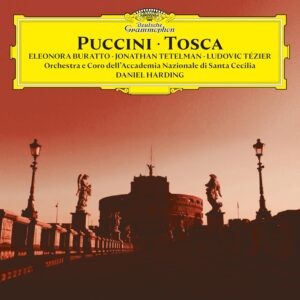There are a few dozen complete recordings of Puccini’s nasty potboiler, Tosca, but the major labels seem to have gotten tired of it some time around 1990. And who can blame them? Including “private” recordings, the eponymous heroine had been available from all the greats by then: Callas and Tebaldi (three or more performances each), Kabaivanska (also several different performances), Caballé, Price, Nilsson, Milanov, Crespin, Olivero, Caniglia. And there’s a gaggle of lighter voiced Toscas out there too: Te Kanawa, Scotto, Ricciarelli, Freni come to mind. Great conductors and great tenors are also easily available. Nevertheless, this new DG release, recorded during a handful of concert performances in October, 2024 and led by Daniel Harding is a valuable addition. It represents a newish but already seasoned trio of soloists worth hearing who are currently gracing opera stages all over the world. No need for any apologies as far as the singing is concerned.
Eleanora Buratto’s mid-weight Tosca is the product of a beautiful voice and fine dramatic instincts. Her opening off-stage calls to Mario have just the right amount of impatience and urgency; she is neither an innocent nor a harridan. She takes her diva-hood with a grain of salt – this is a Tosca who is more young woman than diva. Flirty and sweet when she longs for their “little house,” pretty fierce with her accusations (“L’Attavanti!”) and dripping with clear disgust towards Scarpia in the church. Her second act builds to a passionate “Vissi d’arte” and her “bacio di Tosca” is fierce without being vulgar. As to those high Cs, the one during the cantata is somewhat wiry, the others are rock solid and the one in the last act is fierce, with a hint of desperation. It’s an intelligent, urgent impersonation.
Ludovic Tézier is a thoroughly convincing Scarpia. Without the inherently nasty tone of Tito Gobbi or the intimidating brutality of Giuseppe Taddei, he nonetheless uses his impressive instrument to give Scarpia a slimy, audible sneer; like Tosca, you want to avoid him as early as the first act. He and Buratto go at it in Act Two like a pair of tigers. It works. The “Te Deum” finds him trying, correctly, to quicken Maestro Harding’s tempo, which is far too much like a dirge. More about Harding later. Jonathan Tetelman is the real ticket. His tenor is big, bright, easily produced and occasionally has a hint of Pavarotti’s sunshine. His Cavaradossi, like almost every other tenor’s, is somewhat generic – lover, conspirator, playful, miserable – and he plays to the balcony. He somehow decides to sing at a level more congenial than a constant mezzo-forte or forte in Act Three and “O dolce mani” is gorgeous. He’d be glorious in the opera house; here his urgency wears thin. Scarpia’s collection of nasty lackeys are all very good, and the Sacristan of Davide Giangregorio is noteworthy for not hiccupping through the part.
Harding takes an orchestral approach to the opera, somewhat a la Karajan, but without the dead Nazi’s sense of drama. Harding is listening to the second horn lines and the lush strings. He lingers. Buratto outsmarts him with her superb breath control, especially in her big aria, but we shouldn’t be noticing the big breaths needed to keep the line. And the Te Deum, as mentioned above, should end in a type of perverted victory; here everyone is yelling and the instrumentalists are playing as loudly as they can. The sonics are totally in-your-face; everyone and everything is too closely miked and the result tires the ear. Hardly a subtle work, this “Tosca” comes across as an affront. Sorry to end this on a negative note: the truth is, if you came across this performance in the opera house, you’d be on your feet at the end. For repeated home listening, it’s a bit much.
































